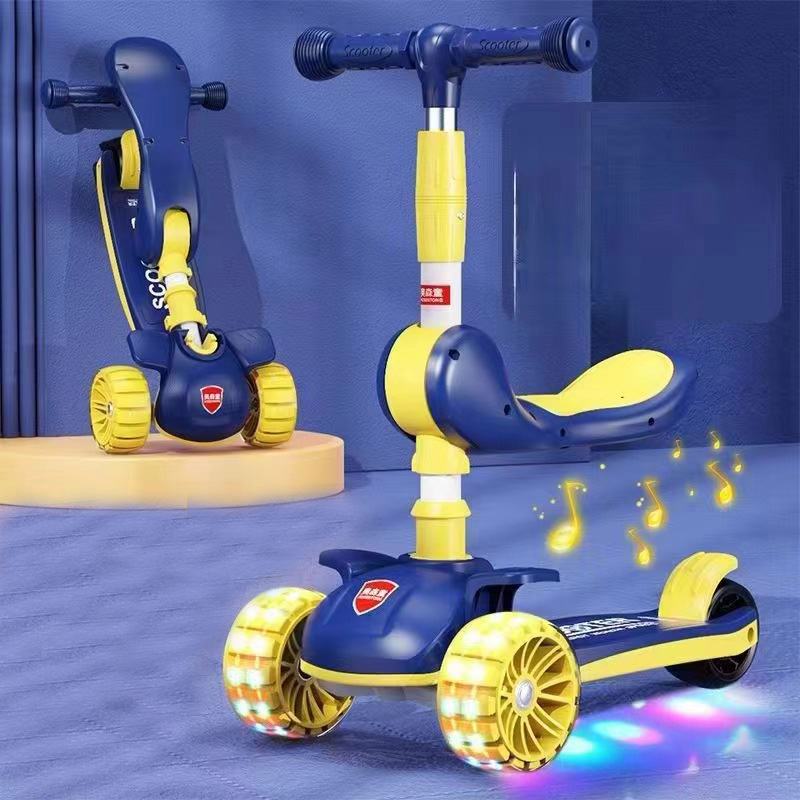The Growing Popularity of Toddler Scooters
In recent years, toddler scooters have surged in popularity among young children and their parents. These fun, vibrant toys not only provide hours of entertainment but also promote physical activity, balance, and coordination. As more families recognize the benefits of active play, scooters have become a staple in many households with toddlers.
Understanding Toddler Scooters
Toddler scooters are specifically designed for young children, typically ranging from ages 2 to 5. Unlike traditional scooters made for older kids, toddler scooters are built with stability and safety in mind. They often feature three wheels for enhanced balance, a lower center of gravity, and a wider footboard, making it easier for toddlers to maintain their footing as they ride.
Most toddler scooters are constructed from lightweight materials, allowing even the smallest of children to maneuver them with ease. Hand grips are also designed to suit little hands, ensuring a comfortable and secure hold while riding. Additionally, many models come with adjustable handlebars to accommodate growth, making them a long-lasting investment for parents.
Benefits of Riding Scooters
Scooters offer numerous benefits that contribute to a toddler's development. One of the primary advantages is physical fitness. Riding a scooter encourages children to be active, promoting cardiovascular health and helping to combat childhood obesity. It also helps improve muscle strength, particularly in the legs, as children push off the ground to gain momentum.
In addition to physical benefits, toddler scooters also play a crucial role in developing balance and coordination. As toddlers learn to steer and navigate their surroundings, they enhance their motor skills significantly. This newfound sense of balance can boost their confidence, allowing them to tackle other physical activities with greater ease.
toddler scooters

Moreover, riding a scooter can encourage social interaction among toddlers. Many children enjoy scooting with their peers at parks or playgrounds, fostering friendships and cooperative play. This social aspect can be pivotal in supporting emotional development, as children learn to share, take turns, and engage with others.
Safety Considerations
While toddler scooters provide many advantages, safety is paramount. Parents should always supervise their young children while they are scooting, especially when riding on sidewalks or in busy areas. It is also essential to equip toddlers with appropriate safety gear, including helmets, knee pads, and elbow pads, to minimize the risk of injury.
Choosing a scooter with safety features such as a wide base and sturdy construction can further enhance protection. Parents should look for models with a low deck height, making it easier for toddlers to get on and off without falling. Additionally, scooters with non-slip footboards can prevent little feet from slipping while riding.
Choosing the Right Scooter
When selecting a scooter for a toddler, parents should consider several factors, including the child's age, size, and skill level. Lightweight options that offer adjustable handlebars will ensure a good fit and promote longer use as the child grows. It’s also beneficial to involve the child in the selection process, allowing them to choose colors or designs they find appealing.
In conclusion, toddler scooters are not just fun toys; they are valuable tools for promoting physical activity, coordination, and social interaction among young children. With safety measures in mind and the right choice of scooter, parents can provide their toddlers with hours of healthy outdoor fun, fostering a lifelong love for active play. As families continue to prioritize fitness and play, the popularity of toddler scooters is likely to keep increasing, proving that these playful rides are here to stay.
-

 Scoot&RideKids Child Kick Push Scooter 3 Wheels with LED Flashing Tilt Lean Boys Girls Scooter
Scoot&RideKids Child Kick Push Scooter 3 Wheels with LED Flashing Tilt Lean Boys Girls Scooter




- 4
$33.17 -

 Scoot&RideKids Scooter Child Kick Flashing LED Light Up 3 Wheel Push Adjustable Folding 3
Scoot&RideKids Scooter Child Kick Flashing LED Light Up 3 Wheel Push Adjustable Folding 3- 0
$25.52 -

 Scoot&RideKids Scooter Child Kick Flashing LED Light Up 3 Wheel Push Adjustable Folding 2
Scoot&RideKids Scooter Child Kick Flashing LED Light Up 3 Wheel Push Adjustable Folding 2- 0
$33.17 -

 Scoot&RideKids Scooter Teens Foldable Kick Push Scooter Adjustable Height Safe 2 Wheels
Scoot&RideKids Scooter Teens Foldable Kick Push Scooter Adjustable Height Safe 2 Wheels




- 4
$49.99
Meet our partners and discover what powers their creativity!
When you register for a Lohas scooter, you will receive a 10% discount on your first order and can be notified of sales, new product launches and other offers in advance.









